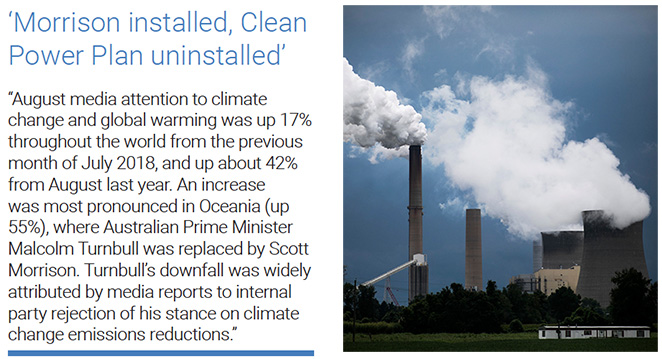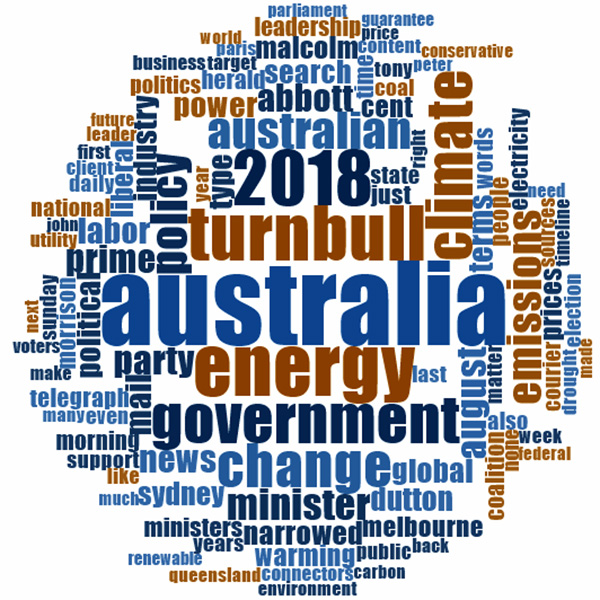Monthly Summaries
Issue 20, August 2018
[DOI]

A power plant in Cheshire, Ohio. Photo: Maddie McGarvey, The New York Times.
In addition, North American coverage was up 27% in August, due primarily to media attention paid to the mid-month proposal by the US Trump Administration to replace the Clean Power Plan with what was dubbed the ‘Affordable Clean Energy rule’.Elsewhere, moderate increases were also detected in Central/South America (up 18%), Africa (up 10%) and Europe (up 8%), while going down only in Asia (down 7%) this month compared to the previous month of July.
In January of this year, MeCCO expanded coverage to sixty-two newspaper sources, six radio sources and six television sources. These span across thirty-eight countries, in English, Spanish, German and Portuguese. In addition to English-language searches of “climate change” or “global warming”, we search Spanish-language sources through the terms "cambio climático" or "calentamiento global", German-language sources through the terms ‘klimawandel’ or ‘globale erwärmung’, and Portuguese-language sources through the terms "mudanças climáticas" or "aquecimento global". Figure 1 shows these ebbs and flows in newspaper media coverage at the global scale – organized into seven geographical regions around the world – over the past 176 months (from January 2004 through August 2018).

Figure 1. Newspaper media coverage of climate change or global warming in sixty-two sources across thirty-five countries in seven different regions around the world, from January 2004 through August 2018.
 Moving to considerations of content within these searches, Figure 2 shows word frequency data in the dynamic spaces of Australian media coverage in August 2018.
Moving to considerations of content within these searches, Figure 2 shows word frequency data in the dynamic spaces of Australian media coverage in August 2018.
Figure 2. Word cloud showing frequency of words (4 letters or more) invoked in media coverage of climate change or global warming in the Sydney Morning Herald, the Courier Mail and Sunday Mail, The Australian, The Age, and The Daily Telegraph and Sunday Telegraph in Australia.
As was noted at the top, considerable attention was paid to political content of coverage during the month of August. Frequent stories from the Southern Hemisphere involved the replacement of Australian Prime Minister Malcolm Turnbull with Scott Morrison. While Morrison was invoked 571 times across 495 articles in August, the focus was on the departure of Prime Minister Turnbull, mentioned 2311 times in the month. Stories like ‘Energy industry anger as PM splits climate from power policy’ by journalists Ben Packham and Greg Brown in The Australian described the fallout from this leadership changeover on energy policy in the country. Another article appearing in the Sydney Morning Herald by journalists Nicole Hasham and Peter Hannam discussed how this change of power would impact Australia’s ongoing adherence or abandonment of the Paris climate treaty. And an opinion piece by former Liberal opposition leader John Hewson in The Age discussed how “climate change has now proved a defining element in a run of Australian political leaders, from John Howard through to Malcolm Turnbull”.
Meanwhile, in the United States, the Trump administration's proposed replacement for the Clean Power Plan an ‘Affordable Clean Energy rule’ generated media coverage in August. For example, journalist Lisa Friedman wrote in an article in The New York Times, “the Trump administration has hailed its overhaul of federal pollution restrictions on coal-burning power plants as creating new jobs, eliminating burdensome government regulations and ending what President Trump has long described as a “war on coal.” The administration’s own analysis, however, revealed on Tuesday that the new rules could also lead to as many as 1,400 premature deaths annually by 2030 from an increase in the extremely fine particulate matter that is linked to heart and lung disease, up to 15,000 new cases of upper respiratory problems, a rise in bronchitis, and tens of thousands of missed school days.”
Also this month, as was the case in July there was significant coverage crossing ecological and meteorological themes. July’s focus on heat gave way also to coverage of wildfires with links to climate change. For example, an Associated Press article make links between the summer wildfires in the Northern Hemisphere and warming temperature that lead to drier conditions and increased changes of fire ignition. In India, severe flooding during the monsoon season in the state of Kerala – the worst in many decades – forced a million people from their homes, and killing nearly 500 people. Amid coverage in Indian media in August, journalist Badri Chatterjee from the Hindustan Times reported that State Environment Impact Assessment Authority chairperson Johny Joseph said “climate change, overflowing dams and manmade causes such as deforestation and illegal mining resulted in Kerala floods”. Journalist Liz Mathew from The Indian Express, quoted State Finance Minister Thomas Isaac who said, "the social cost is unimaginable, the trauma is heavy”.
Across the globe in August there were a range of stories that intersected with the cultural arena. For example, a citizens’ ballot initiative in the US state of Colorado regarding a proposal to increase the ‘setback’ distance between homes and businesses and oil and gas wells drew media consideration. Dan Elliott from the Associated Press called the proposal – that could put 85% of non-federal land off-limits – ‘contentious’; Rebecca Elliott from The Wall Street Journal claimed that if approved, this potential precedent-setting ballot measure “would make most of the State off limits to drillers”. As a second example, television media stories surfaced of a crowdfunding campaign by residents in a community near Madison, Wisconsin to raise funds to purchase and install air monitors to detect pollution from a nearby coal-fired power plant. This novel way to take matters into citizen’s own hands was seen as a new turn in citizen science meeting public health concerns relating to climate change. Journalist Shirley Descorbeth from CBS quoted Miranda Erhlich with the ‘Clean Power Coalition’ citizen action group who said, “For residents who have breathing issues, and want to know what the air is like on a daily basis, those monitoring reports are not helpful, so we are putting up these…monitors because it'll give us a sense of what's in the air on a daily basis”. Reporter Madeline Anderson from a Fox News affiliate quoted industry representative ‘We Energies’ spokesperson Brian Manthey, who dismissed residents’ concerns, stating "We have made great strides…to keep the coal and coal dust from leaving the [coal plant] property”.
Media accounts also focused on primarily scientific dimensions of climate change and global warming. For example, a study dubbed ‘Hothouse Earth’ was published in the Proceedings of the National Academy of Sciences (PNAS) describing how runaway global warming could result from positive climate feedback loop in the climate system. In describing the study, journalist Doyle Rice from USA Today wrote “we have been warned”. As a second example, a study by Andrew J. Kondash, Nancy E. Lauer and Avner Vengosh published in Science Advances found that water use for and toxic wastewater produced from hydraulic fracturing (of ‘fracking’) has increased dramatically over the past five years. Science correspondent Josh Gabbatiss from The Independent in London reported that “the amount of water used at fracking wells in parts of the US has increased by up to 770%, sparking fears the industry could cause water shortages in arid regions. There was also a massive increase of up to 1440% in the amount of toxic wastewater generated in the first year of operation at fracked oil and gas wells over the same period.”
As summer gives way to Autumn in the Northern Hemisphere, we at the Media and Climate Change Observatory will continue to track media attention to climate change, amid competing interests in other political, social, environmental, economic, and cultural issues around the globe.
